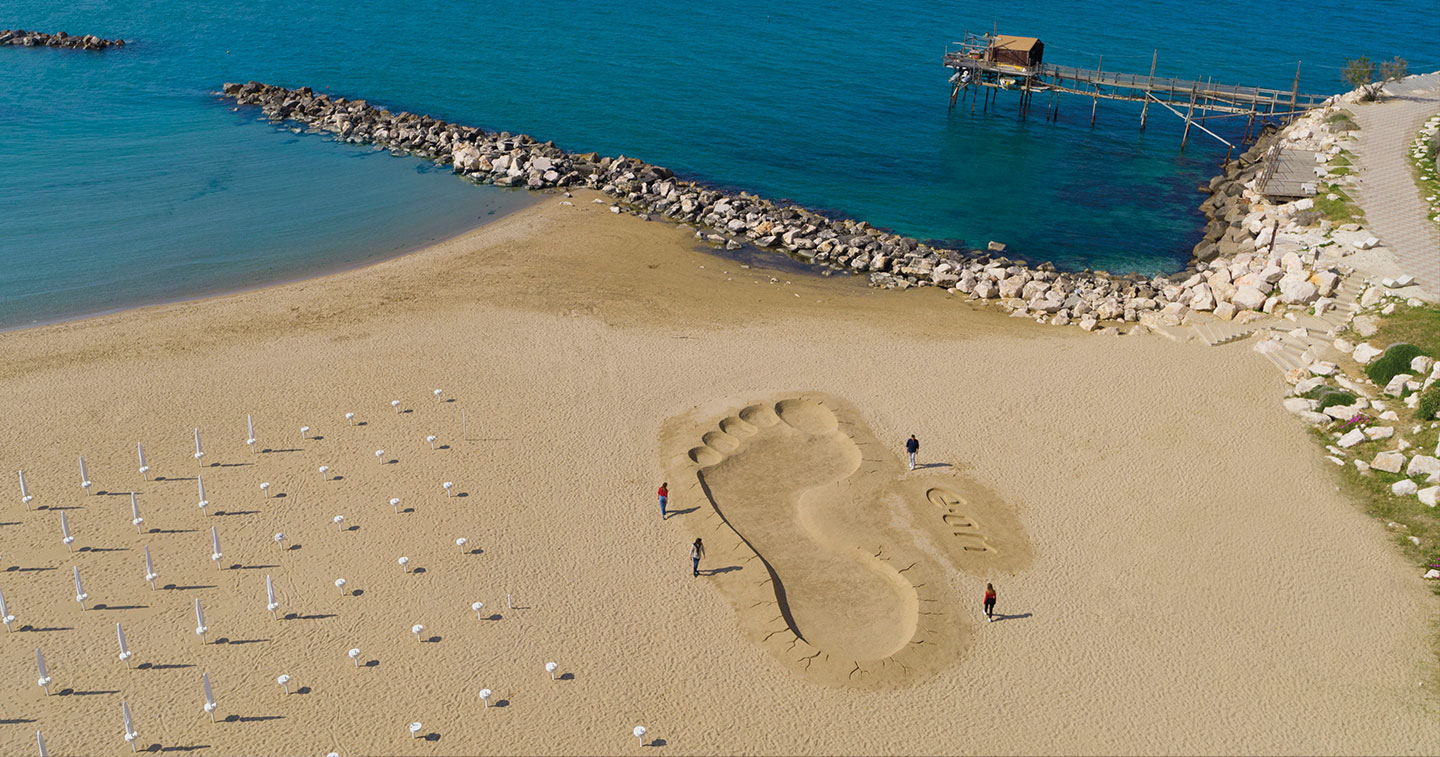ROME, ITALY – E.ON Italia, one of the country’s most important energy operators and committed to driving the energy transition, has created a 23-metre-long human footprint on the beach in Termoli (Molise, central Italy). The size isn’t random, because it represents the footprint of a giant weighing seven tonnes, which is the amount of CO 2 that every Italian produces on average in a year (Source: Istat 2019).
The installation is based on a simple calculation: if an average man weighing 80 kg has a foot 26 cm long, how big would the footprint be of a giant weighing 7 tonnes? That’s right, 23 metres.
The purpose of the campaign is to make visible a problem that is normally invisible, like the impact of each of us on the environment and on the Planet. This is a deeply felt issue for E.ON, which for years has been promoting the responsible use of energy and providing energy solutions that can help us reduce our impact on the environment. It is a commitment that saves 99 million tonnes of CO 2 emissions a year.
Daniele Dionisi, Executive Creative Director at DLV BBDO, said: “Seven tonnes is a huge amount. So why is it so hard for us to take action on climate change? Because the Carbon Footprint is an abstract, volatile concept. Well, here it is in all its massiveness: the footprint of a seven-tonne giant.”
“E.ON is proud of this challenging and unconventional campaign, which springs from a truly surprising installation that has successfully made the invisible visible,” said Mauro Biraghi, Corporate and Marketing Communication Director at E.ON Energia.
The work was made entirely by hand, without mechanical equipment or chemical additives, by the sculptors of the “Accademia della Sabbia.”
The footprint left its mark, but without leaving a trace, and in fact disappeared from the beach in Termoli on May 8. However, thanks to Google, which took 360-degree photos of the installation (shot at beach level) and aerial photos from directly above using a drone, it will continue to be visible indefinitely on Google Maps.
The installation featuring the footprint is the starting point for a 360-degree communication project involving a series of actions and media investments planned until June 4, including radio mentions, a print and outdoor campaign, a TV commercial and digital amplification. Influencers and Content Creators have also been involved with the help of media agency Hearts & Science, which handled the social planning. PR activities and Media relations has been handled by Weber Shandwick Italia.
CREDITS
Creative agency: DLVBBDO
Executive Creative Direction: Serena Di Bruno and Daniele Dionisi
Art Director: Davide Poli, Alberto Terribile
Copywriter: Eleonora Dini, Alessia Buono
General Manager: Chiara Niccolai
Client Service Director: Cristina Pontello
Account Supervisor: Julie de Biolley
Junior Account: Giulio Melegari
Producer: Alessandro Sardini
Head of social: Andrea Quarini
Social Media manager: Davide Spinelli
Production company: Bedeschi Film
Executive Producers: Giovanni Bedeschi, Federico Salvi
Producer: Fulvio Biavaschi
Director: Claudio Gallinella
Dop: Stefano Bella
Editors: Andrea Besana, Francesca Castellari, Tommaso Bedeschi
Sound Design & Mix: Sample Milano
Social Planning & Influencer Mktg: Hearts & Science
Managing Director: Emanuele Giraldi
Client Business Director: Francesca Guarnaccia
Head of Communication Design: Monica Zanaga
Creative Specialist: Giorgia Furia
Media Planning: Starcom (Publicis Groupe)
CEO Starcom Italia: Boaz Rosenberg
Client Service Director: Elena Bianchi
Media Supervisor: Monica Fiorani
Press Office & Media Relations: Weber Shandwick Italia
Communication Strategist: Francesca Baldini
Client lead: Nadia Lauria
Account director events: Novella D’Incecco
Account Executive PR and Media Relations: Giulia Calamia
Account Executive PR and Media Relations: Luigi Rossiello








